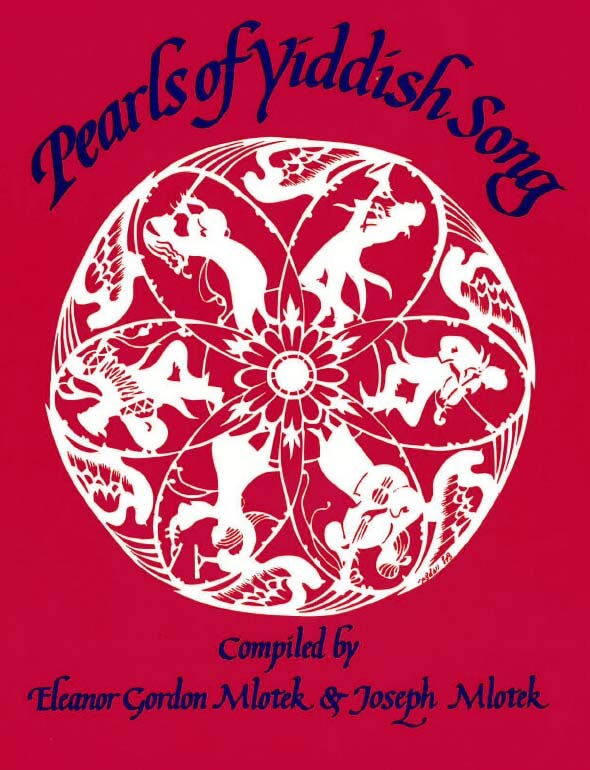Based on Genesis 13:18 and 15:15 and the promise that the seed of Abraham will be as plentiful as the dust on the earth and the stars in the firmament. Words by Simon S. Frug (1880-1918).
Several melodies were composed by Abraham M. Bernstein and others. The one presented here is anonymous. It was sung by compiler Yosl Mlotek in the ’30’s in Warsaw and is similar to a version published by both H. Lefkowitch (New York) and in Talons harfe (Warsaw), 1917.

The moon shines, the stars glitter.
The night covers mountain and valley.
The ancient book lies open before me.
I read it, I read it a thousand times.
I read the holy, beloved words.
I hear a voice: “I swear, My people, you will be like the stars in the sky
And like the sand along the shore.”
Lord of the Universe! Nothing will be lost of Your promise — not a single word.
Your holy wish must be fulfilled.
Everything comes in its time, in its place.
And a part has already been fulfilled.
I feel it, I know it for certain.
We have become like loose sand everyone tramples with their feet.
Yes, dear God, true, like sand and like stones,
Dispersed and scattered, mocked and shamed.
But the stars, the bright stars — the stars, the stars — where are they, God?
Es shaynt di levone, es glantsn di shtern;
Di nakht shvebt oyf barg un oyf tol…
Dos altitshike bikhele ligt far mir ofn,
Ikh leyen es un leyen es toyznter mol.
Ikh leyen di heylike, tayere verter,
Mir hert zikh a shtime, “lkh shver —
Mayn folk, du vest zayn vi di shtern in himl,
Vi zamd oyfn breg funem mer. . .”
Reboyne-shel-oylem! es vert nit farfaln
Fun dayne havtokhes keyn eyntsik vort;
Mekuyem muz vern dayn heyliker viln,
Alts kumt in zayn tsayt, oyf zayn ort.
Un eyns iz shoyn take mekuyem gevorn —
Dos fil ikh, dos veys ikh gevis;
Mir zaynen gevorn vi zamd, vos iz hefker,
Vos yederer tret mit di fis. . .
Yo, gotenyu, emes, vi zamd un vi shteyner,
Tseshpreyt un tsevorfn oyf shand un oyf shpot. . .
Nu, ober di shtern, di likhtike, klore —
Di shtern, di shtern — vu zaynen zey, got?!
עס שײַנט די לבֿנה, עס גלאַנצן די שטערן;
די נאַכט שװעבט אױף בערג און אױף טאָל. . .
דאָס אַלטיטשקע ביכעלע ליגט פֿאַר מיר אָפֿן
איך לײען עס און לײען עס טױזנטער מאָל.
איך לײען די הײליקע, טײַערע װערטער,
מיר הערט זיך אַ שטימע „איך שװער —
מײַן פֿאָלק, דו װעסט זײַן װי די שטערן אין הימל,
װי זאַמד אױפֿן ברעג פֿונעם מער. . .‟
רבונו־של־עולם! עס װערט ניט פֿאַרפֿאַלן
פֿון דײַנע הבֿטחות קײן אײנציק װאָרט:
מקוים מוז װערן דײַן הײליקער װילן,
אַלץ קומט אין זײַן צײַט, אױף זײַן אָרט.
און אײנס איז שױן טאַקע מקוים געװאָרן —
דאָס פֿיל איך, דאָס װײס איך געװיס;
מיר זענען געװאָרן װי זאַמד, װאָס איז הפֿקר,
װאָס יעדערער טרעט מיט די פֿיס. . .
יאָ, גאָטעניו, אמת, װי זאַמד און װי שטײנער,
צעשפּרײט און צעװאָרפֿן אױף שאַנד און אױף שפּאָט. . .
נו, אָבער די שטערן, די ליכטיקע, קלאָרע —
די שטערן, די שטערן — װוּ זענען זײ, גאָט?!
Song Title: Zamd Un Shtern

First published in 1988 as Pearls of Yiddish Song: Favorite Folk, Art and Theatre Songs, this anthology contains 115 songs. Some material had never been published, while others, included in rare song collections or sheet music, were largely inaccessible. The songs presented reflect Jewish life in Eastern Europe and the United States and depict childhood, love, family celebrations, poverty, work and struggle. There are also songs from the Hasidic and Maskilic movements, songs of Zion and of America, as well as songs from the Yiddish theater.
The title of this anthology derives from the weekly two-page feature column “Pearls of Yiddish Poetry,” which the compilers Yosl and Chana Mlotek initiated in 1970 in the Yiddish newspaper Der Forvertz (the Yiddish Daily Forward). Hundreds of readers from around the world — including authors, composers, singers, actors — became co-participants in this collective folk project and recalled melodies, lines, fragments, stanzas and their variants of songs, poems, and plays which they had heard in their youth. At first, readers sent in only written material. Later, they also taped songs on cassettes, many of whose melodies had, until then, never been recorded. They also identified and supplied missing information regarding lyricists, poets, and composers and described the circumstances surrounding the songs’ origins, their dissemination, diffusion and impact.